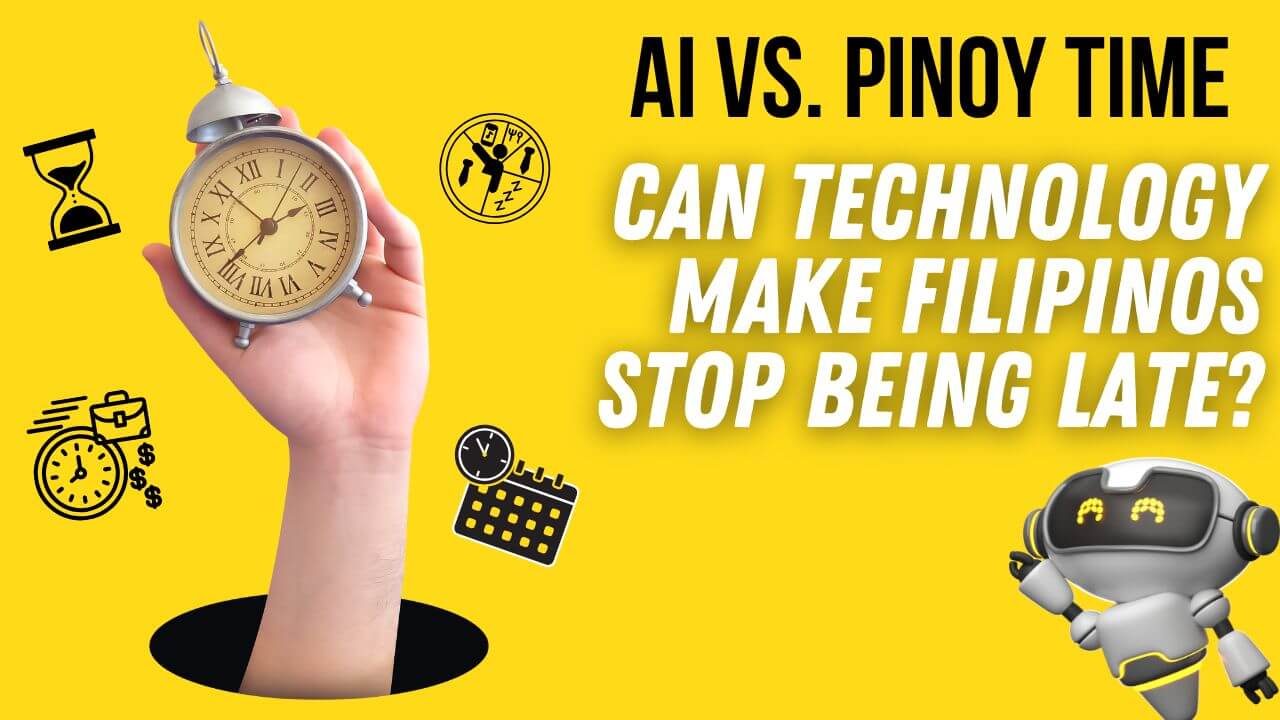Filipinos are known for hospitality, resilience, and the ability to turn any situation into a karaoke night. But there’s another undeniable trait that has stood the test of time: Pinoy Time—the magical ability to say “I’m on the way!” while still getting dressed.
As AI advances, promising traffic prediction, smart scheduling, and automated reminders, could technology finally make Filipinos show up on time? Or is AI no match for our legendary ability to bend time itself?
Is Pinoy Time for Real? How About Other Countries?
Pinoy Time isn’t just a myth—it’s a cultural phenomenon. Whether it’s a family reunion, a business meeting, or a wedding, showing up exactly on time is rare. There’s often an unspoken grace period before things truly begin, as if time itself adjusts to fit the Filipino schedule.
But is this exclusive to the Philippines? Not at all. Many cultures have their versions of “flexible timekeeping”:
🔹 Latin America & Spain: The concept of La Hora Española (Spanish Time) means events rarely start on time, similar to the Filipino approach.
🔹 India & the Middle East: There’s an expectation of fluid time, where arriving late isn’t necessarily disrespectful.
🔹 Italy & Greece: Social gatherings tend to start later than scheduled, focusing more on interaction than strict punctuality.
Even in Western countries, while professionalism demands being on time, casual gatherings often follow a more relaxed approach, just not as extreme as Pinoy Time.
AI’s Battle Against Filipino “On the Way” Culture
Let’s be honest—AI can do many things, but can it outsmart a Filipino’s commitment to arriving late yet still being “on the way”?
Here’s what AI is trying to do:
✅ Traffic Prediction – Apps like Google Maps, Waze, and AI-powered commute assistants tell you exactly how long your trip will take. Problem? This assumes you left the house when you said you did.
✅ Smart Scheduling – AI can analyze your calendar, warn you about conflicting appointments, and adjust timelines. Problem? Filipinos accept invites to multiple events at the same time, knowing full well they’ll pick one at the last minute.
✅ Automated Reminders – AI can send alerts like “Leave now if you want to arrive on time.” Problem? A Filipino sees this and thinks: “Ah, that means I still have time to finish this episode.”
Technology is trying, but some habits just refuse to budge.
The Filipino “Grace Period” and Its AI Resistance
There’s an unspoken agreement in Filipino culture: If a gathering starts at 6 PM, no one expects people to be there at 6 PM. Whether it’s a barkada dinner, a business meeting, or even a wedding, there’s always a grace period before things kick off.
AI doesn’t get this—it assumes humans operate with military precision, leaving exactly when planned. Filipinos, however, operate on a flexible reality, where time is relative and adjustable based on how much fun we’re having.
Even AI calendar assistants don’t stand a chance. If they reminded us, “Your meeting is in 30 minutes,” we’d simply reply “Noted.”—which translates to “I’ll leave in 45.”
Can AI Adapt to Pinoy Time?
If AI wants to win against Filipino lateness, it needs to evolve:
🔹 Reminder Delay Detector – AI should wait 15 minutes before reminding us again, knowing we ignored the first one.
🔹 Pinoy Traffic Realism Mode – Instead of travel time, AI should calculate the real time of arrival, factoring in stopovers, last-minute errands, and unplanned food trips.
🔹 “Tropa Buffer” Alert – AI should estimate how late everyone else will be, letting us know whether we still have time to procrastinate.
Conclusion: AI Can Improve Many Things—But Pinoy Time Is Built Different
Artificial intelligence is changing industries, enhancing productivity, and optimizing human behavior. But can it defeat Filipino Time? Maybe someday.
Until then, AI will keep sending reminders, adjusting schedules, and recalculating routes—while Filipinos continue living by their version of time, arriving fashionably late, but always with a good excuse.
Sources
📌 Filipino Time: A Culture of Flexibility – Explores the historical roots and social implications of time perception in the Philippines 🔗 https://www.rappler.com/life-and-style/travel/filipino-time-cultural-perspective
📌 AI and Time Management: Can Smart Assistants Improve Punctuality? – Discusses AI-powered scheduling, traffic prediction, and reminders 🔗 https://www.forbes.com/sites/forbestechcouncil/2024/03/08/how-ai-is-changing-the-way-we-manage-time/
📌 Cultural Perspectives on Time: How Other Countries View Punctuality – Covers different time habits across the world 🔗 https://www.worldtime.com/time-perception-different-cultures






